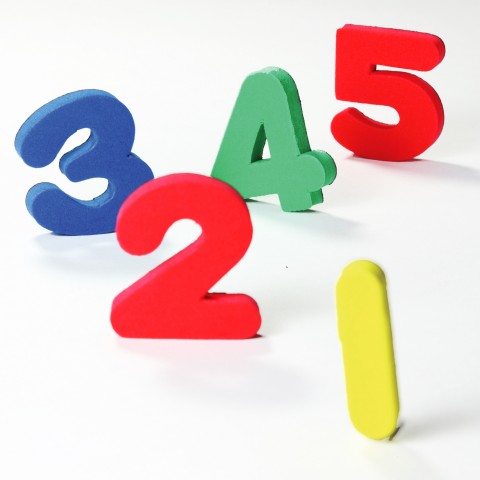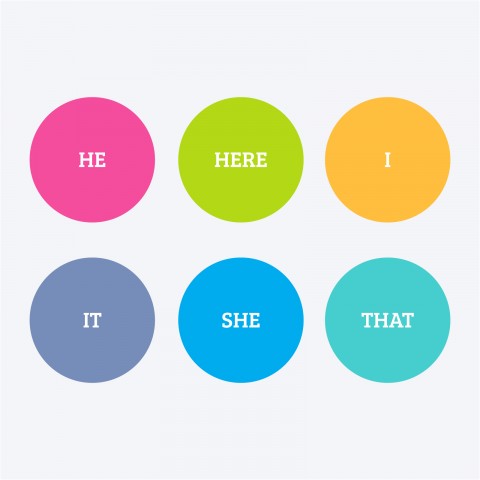
Are you a yeni başlayan (“beginner”) in Turkish?
If you’ve just started learning the language, it’s a good idea to begin with the basics.
Acquiring a rudimentary vocabulary is the first step toward proficiency. By learning the essential Turkish words for beginners, you’re building a base upon which to further develop your language skills. With only a few words, you’ll be able to start communicating with native speakers and fulfilling your daily obligations while in Turkey. Then, you can start working on the grammar and building sentences using the simple words you’ve learned.
In this article, we’ve compiled a masterlist of the most useful Turkish beginner words. We’ve included everything from numbers to conjunctions to ensure you’re not missing out on any essentials!
Ready? Let’s start with something simple.
 Table of Contents
Table of Contents
- Numbers
- Pronouns
- Nouns
- Adjectives
- Adverbs
- Verbs
- Conjunctions
- Discover More About the Turkish Language on TurkishClass101.com
1. Numbers
One of the first things you should add to your Turkish vocabulary are numbers. We use them every day in a variety of contexts, from shopping to planning dates.
Let’s count from 0 to 10 in Turkish:
| 0 | Sıfır |
| 1 | Bir |
| 2 | İki |
| 3 | Üç |
| 4 | Dört |
| 5 | Beş |
| 6 | Altı |
| 7 | Yedi |
| 8 | Sekiz |
| 9 | Dokuz |
| 10 | On |

Important note:
When a Turkish noun is plural and preceded by a number, the noun does not take the usual -lar / -ler plural suffixes. Rather, it retains its singular form as the number indicates that it’s plural.
Examples:
- Elma – “Apple”
- Bir elma – “One apple”
- İki elma – “Two apples”
2. Pronouns
As you start speaking Turkish, pronouns will have your back time and again. There are four categories of pronouns we’ll be looking at today: personal, demonstrative, possessive, and interrogative.
Personal Pronouns
There are six personal pronouns in Turkish. Since Turkish has no grammatical gender, there’s only one personal pronoun for the third person singular (he / she / it).
I would like to point out one more thing: The second person plural pronoun (siz) also functions as the polite form of the second person singular.

| Turkish | English |
| Ben | I |
| Sen | You |
| O | He / She / It |
| Biz | We |
| Siz | You |
| Onlar | They |
Demonstrative Pronouns
| Turkish | English |
| Bu | This |
| Şu | That |
| Bunlar | These |
| Şunlar | Those |
Possessive Pronouns
| Turkish | English |
| Benim | My |
| Senin | Your |
| Onun | His / Her / Its |
| Bizim | Our |
| Sizin | Your |
| Onların | Their |
Interrogative Pronouns
| Turkish | English |
| Ne | What |
| Kim | Who |
| Hangi | Which |
You’ll see some of these pronouns used in example phrases below. Take note, because understanding their use in context will be helpful as you start learning how to build sentences with your new vocabulary.
3. Nouns
Nouns are the words we use to label people, places, things, and concepts. Unlike some other languages, Turkish nouns do not have grammatical gender.
Below, you’ll find the most essential nouns in Turkish for beginners grouped by category. If you want to pick up even more words, though, you should check out our dedicated Turkish nouns article!
Time
Here are the days of the week and some other words related to time.
| Turkish | English |
| Pazartesi | Monday |
| Salı | Tuesday |
| Çarşamba | Wednesday |
| Perşembe | Thursday |
| Cuma | Friday |
| Cumartesi | Saturday |
| Pazar | Sunday |
| Gün | Day |
| Hafta | Week |
| Ay | Month |
| Yıl | Year |
| Saat | Hour |
| Dakika | Minute |
Now, let’s use some of these words with numbers:
- Üç ay – “Three months”
- İki saat – “Two hours”
- Beş dakika – “Five minutes”
Places
| Turkish | English |
| Dünya | World |
| Kıta | Continent |
| Ülke | Country |
| Şehir | City |
| Deniz | Sea |
| Restoran | Restaurant |
| Market | Market |
| Hastane | Hospital |
| Postane | Post office |
Let’s see how these words might be used with the Turkish pronouns we saw earlier:
- Şu market – “That market”
- Benim ülkem – “My country”
- Hangi restoran? – “Which restaurant?”
Transportation
While trying to get around in Turkey, you’ll benefit from knowing the basic words and terms for transportation.
| Turkish | English |
| Metro | Subway |
| Otobüs | Bus |
| Taksi | Taxi |
| Araba | Car |
| Tren | Train |
| Uçak | Airplane |
| Bisiklet | Bicycle |
| Yol | Road |
| Trafik ışıkları | Traffic lights |
| Otobüs durağı | Bus stop |
| Havaalanı | Airport |
| Tren istasyonu | Train station |
And here’s how these beginner Turkish words might be used with pronouns:
- Bu otobüs durağı – “This bus stop”
- Benim arabam – “My car”
- Hangi otobüs? – “Which bus?”
Technology
Technology is everywhere. Who knows where and when you’ll need to know a few technology-related words?
| Turkish | English |
| İnternet | Internet |
| Web sitesi | Website |
| Wi-Fi | Wi-Fi |
| Bilgisayar | Computer |
| Dizüstü bilgisayar | Laptop |
| Tablet | Tablet |
| Cep telefonu | Cellphone |
| Şarj aleti | Charger |
School
If you’ve decided to pursue your studies in Turkey, memorizing these essential school-related terms will prove useful.
| Turkish | English |
| Okul | School |
| Lise | High school |
| Ortaokul | Middle school |
| İlkokul | Elementary school |
| Ödev | Homework |
| Öğretmen | Teacher |
| Sınav | Exam |
| Kitap | Book |
| Defter | Notebook |
| Kalem | Pen / Pencil |
Occupations
Knowing the terms for common occupations will come in handy when introducing yourself or someone else.
| Turkish | English |
| Doktor | Doctor |
| Hemşire | Nurse |
| Avukat | Lawyer |
| Mühendis | Engineer |
| Öğretmen | Teacher |
| İş adamı | Businessman |
| İş kadını | Businesswoman |
| Yönetici | Manager |
| Mimar | Architect |

Family Members
Here are some nouns you can use to introduce your family:
| Turkish | English |
| Aile | Family |
| Eş | Spouse |
| Kız evlat | Daughter |
| Erkek evlat | Son |
| Anne | Mom |
| Baba | Dad |
| Ebeveyn | Parent |
| Kardeş | Sibling |
| Kuzen | Cousin |
| Çocuk | Child |
Body Parts
In case of a medical emergency, knowing the body parts in Turkish will be crucial. Here’s a handy list for your reference:
| Turkish | English |
| Vücut | Body |
| Baş / Kafa | Head |
| Omuz | Shoulder |
| Kol | Arm |
| El | Hand |
| Bacak | Leg |
| Ayak | Foot |
| Yüz | Face |
| Göz | Eye |
| Burun | Nose |
| Ağız | Mouth |
| Kulak | Ear |
| Parmak | Finger |
Food and Beverages
Food is vital to our wellbeing, so these words should be some of the first you memorize! You’ll use them while grocery shopping, ordering at a restaurant, or cooking at home.
| Turkish | English |
| Sebze | Vegetable |
| Et | Meat |
| Tavuk | Chicken |
| Balık | Fish |
| Meyve | Fruit |
| Tatlı | Dessert |
| Su | Water |
| Bira | Beer |
| Şarap | Wine |
| Çay | Tea |
| Türk kahvesi | Turkish coffee |
You can learn even more Turkish nouns for food, utensils, and tableware on our website.
4. Adjectives
Adjectives are used to describe nouns, whether we’re talking about objects, people, feelings, situations, or environments. As a beginner in Turkish, learning a few common adjectives will help you better express yourself and add flair to your speech or writing.
Describing Objects
You just need two words to describe an object: the correct noun and the adjective of your choice. Below are some frequently used adjectives for describing objects.
| Turkish | English |
| Büyük | Big |
| Küçük | Small |
| Uzun | Long |
| Kısa | Short |
| İnce | Thin |
| Kalın | Thick |
| Geniş | Wide |
| Dar | Narrow |
| Ağır | Heavy |
| Hafif | Light |
| Sivri | Sharp |
| Yassı | Flat |
| Sert | Hard |
| Yumuşak | Soft |
Now, let’s use some of these adjectives with the nouns we learned above:
- Büyük şehir – “Big city”
- Dar yol – “Narrow road”
- Yumuşak kalem – “Soft pen/pencil”
- Küçük burun – “Small nose”
Describing People
| Turkish | English |
| Güzel | Beautiful |
| Yakışıklı | Handsome |
| Çekici | Attractive |
| Çirkin | Ugly |
| Kısa boylu | Short |
| Uzun boylu | Tall |
| Zayıf | Thin |
| Şişman | Fat |
| Yaşlı | Old |
| Genç | Young |
Examples:
- Güzel çocuk – “Beautiful child”
- Yakışıklı öğretmen – “Handsome teacher”
- Genç bir mühendis – “A young engineer”
Describing Emotions
| Turkish | English |
| Mutlu | Happy |
| Üzgün | Sad |
| Heyecanlı | Excited |
| Şaşkın | Surprised |
| Neşeli | Joyful |
| Kızgın | Angry |
| Gergin | Tense |
| Sinirli | Nervous |
| Sakin | Calm |
| Endişeli | Worried |
Examples:
- Mutlu bir anne – “A happy mother”
- Endişeli bir baba – “A worried father”
Describing the Weather
| Turkish | English |
| Yağmurlu | Rainy |
| Bulutlu | Cloudy |
| Rüzgarlı | Windy |
| Güneşli | Sunny |
| Karlı | Snowy |
| Sisli | Foggy |
| Soğuk | Cold |
| Sıcak | Hot |
| Ilık | Warm |
Examples:
- Yağmurlu bir gün – “A rainy day”
Soğuk bir gün – “A cold day”

5. Adverbs
An adverb gives additional information about a verb, an adjective, another adverb, a phrase, or a clause. It basically answers questions regarding where, when, how, and why something happened. You can refer to our relevant blog article for more about adverbs.
Once we go over some verbs in the following section, you’ll see some examples of how these adverbs might be used.
Qualitative Adverbs
| Turkish | English |
| İyi | Well |
| Kolayca | Easily |
| Sessizce | Quietly |
| Hafifçe | Lightly |
| Basitçe | Simply |
| Açıkça | Frankly / Openly / Clearly |
Adverbs That Indicate the Time of Action
| Turkish | English |
| Dün | Yesterday |
| Dün gece | Last night |
| Bugün | Today |
| Bu sabah | This morning |
| Bu gece | Tonight |
| Yarın | Tomorrow |
| Gelecek hafta | Next week |
| Şimdi | Now |
| Hemen | Immediately |
| Hemen şimdi | Right now |
Adverbs That Show Quantity / Measurement
| Turkish | English |
| Az | Little / Few / A bit |
| Biraz | Some / A little |
| Çok | Much / Many / Very / Too much |
Adverbs That Indicate Frequency
| Turkish | English |
| Bazen | Sometimes |
| Asla | Never |
| Daima | Always |
| Sık sık | Frequently |
| Nadiren | Rarely |
Interrogative Adverbs
| Turkish | English |
| Ne zaman | When |
| Ne kadar | How much / How long |
| Nasıl | How |
| Niçin | Why |
6. Verbs
Verbs are the most important building block of sentences. They show actions, occurrences, processes, conditions, and states of being.
Verbs Used for Daily Routine
| Turkish | English |
| Uyumak | To sleep |
| Uyanmak | To wake up |
| Kalkmak | To get up |
| Gelmek | To come |
| Gitmek | To go |
| Yemek | To eat |
| İçmek | To drink |
| Çalışmak | To work |
| Ders çalışmak | To study |

Examples:
- O sessizce gitti. – “He/she/it went quietly.”
- Dün gece çok az uyudum. – “I slept very little last night.”
- O ne kadar ders çalışır? – “How long does he study?”
Action Verbs
| Turkish | English |
| Koşmak | To run |
| Oynamak | To play |
| Yürümek | To walk |
Examples:
- O sık sık koşar. – “He/she/it frequently runs.”
- O ne zaman koşar? – “When does he/she/it run?”
Verbs of Emotion
| Turkish | English |
| Sevmek | To love |
| Nefret etmek | To hate |
| İstemek | To want |
Examples:
- Seni seviyorum. – “I love you.”
- Ondan niçin nefret ediyorsun? – “Why do you hate him/her/it?”

Possession Verbs
| Turkish | English |
| Sahip olmak | To have / To own |
| Ait olmak | To belong |
Example:
- Bu araba bana ait. – “This car belongs to me.”
Verbs Related to the Senses
| Turkish | English |
| Duymak | To hear |
| Görmek | To see |
| Koklamak | To smell |
Thought-related Verbs
| Turkish | English |
| Düşünmek | To think |
| Bilmek | To know |
| İnanmak | To believe |
| Hatırlamak | To remember |
Example:
- Onu daima iyi hatırlayacağım. – “I will always remember him/her/it well.”
7. Conjunctions
Conjunctions are those small words we use to connect words or phrases together. These are essential beginner words in Turkish as they’ll allow you to sound more fluid when speaking and add clarity to your writing, even if you have a limited vocabulary.
Here are some common conjunctions in Turkish:
| Turkish | English |
| Fakat / Ama | But |
| Çünkü | Because |
| Ve | And |
| Veya | Or |
| Böylece | So |
Examples:
- Okula bisiklet ile veya araba ile gidiyorum. – “I go to school by bike or by car.”
- Kuzenim mutlu ama endişeli. – “My cousin is happy but worried.”
8. Discover More About the Turkish Language on TurkishClass101.com
You’ve now learned quite a number of useful beginner Turkish words. However, there are many more words to memorize and grammatical concepts to explore.
Learning Turkish is simple with TurkishClass101. We provide our students with numerous audio lessons and recordings, tons of vocabulary lists, and a variety of free resources (including this Turkish dictionary) that you can refer to. You can also utilize our MyTeacher service, which allows you to study and practice 1-on-1 with a native Turkish teacher.
What’s more, you can download the app for free and use it wherever you are.
It’s our goal to help you learn Turkish in a fun and effective manner, all at your convenience. As such, we welcome any feedback or questions you may have!
Before you go: How many of these words did you know already? Were most of them new to you? We look forward to hearing from you in the comments!










